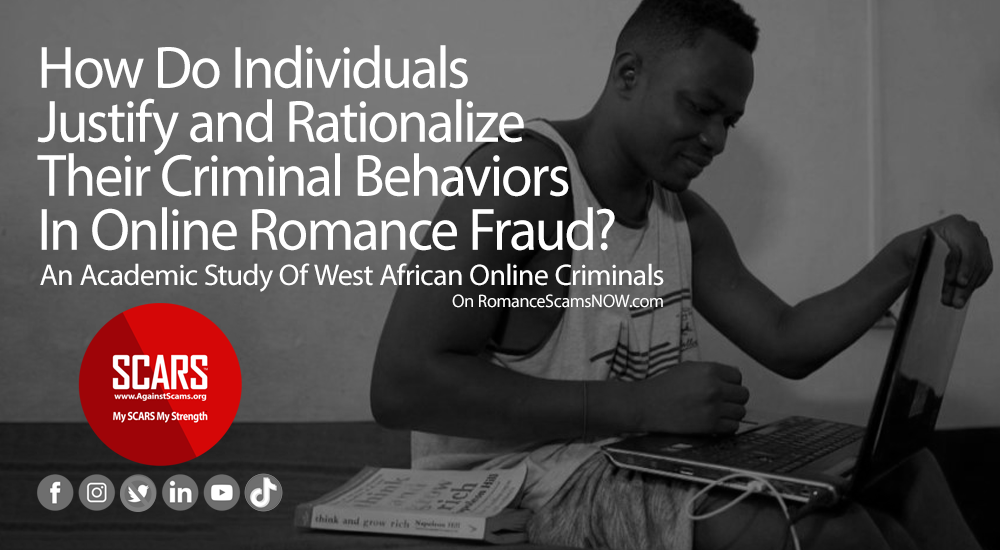
SCARS Institute’s Encyclopedia of Scams™ Published Continuously for 25 Years

Clues To Help You Quickly Spot A Romance Scam
Thanks to online relationship scams, romance scams, or dating scams, each year millions of people who are searching for love, and many who are not, end up with nothing but a broken heart and an empty wallet.
While online dating and social media sites have become increasingly popular tools to find love and friendship, they’ve unfortunately also become popular tools for fraudsters known as romance scammers. These con artists create fake profiles to lure in victims, establish romantic relationships and eventually, extort money.
In this quick guide, we will identify common online romance scams and offer some tips on how to tell if someone is scamming you online.
4 Common Signs of a Romance Scam
Romance scammers are experts in social engineering and manipulation and sound very convincing.
Many of the signs of a romance scammer are subtle and insidious because the scammer is trying to build trust before they exploit you. To avoid online dating scams, be on the lookout for these four red flags when you’re getting to know someone online:
1. Quick Love
Romance Scammers Profess Love Quickly without having met you!
Frequently, the first sign of an online dating scam shows up when a romance scammer expresses strong emotions in a relatively short period of time. They may even say that they’re in love with you, but it’s a tactic they’re using to get you to give up personal details and answers to the security questions that you use to lock down your accounts across the Internet. Guard your personal information carefully, and be wary if a new love interest asks for personal details soon after contact.
2. They Always Bring Up Money
a. There Is Always An Emergency
Romance Scammers Claim to Need Money for Emergencies, Hospital Bills, or Travel
Be suspicious of anyone who asks you for financial assistance, no matter how dire their circumstances seem to be. If you encounter one of these storylines when you’re talking to a new love interest on the internet, there’s a good chance they’re scamming you.
- “I need money to support a sick relative.”
- “I need a short-term loan for airfare to visit you.”
- “I need some startup money for a business venture.”
- “I need funds to finalize a loved one’s funeral.”
- “I’m a US service member overseas, and I need some money.”
b. No Emergency, Just An Investment
Many current romance scams do not spin an emergency story. Instead, they work to build up trust and then introduce an investment opportunity.
There refer you to very good-looking websites or phone apps – it all seems so real, but it is not! After you make a small investment, you may actually get money back with profits – stolen from other victims of course. It is when you place the larger investment that it all folds up and the scammer disappears.
3. Quick Switch To Another Messaging Platform
Online Romance Scammers try to Lure You off the Dating Site or Social Media to a Messaging Platform
Often, scammers convince victims to leave the dating site or social media and use personal email or instant messaging to continue communication. At first, this might not seem like a red flag. When you are getting to know someone, you’ll naturally want to move beyond the dating site and use other forms of communication. Be very cautious when someone asks for your phone number or email address. This makes it even easier for them to access your personal information.
If you want to communicate outside of the dating site, set up an alternate email address or utilize an instant messaging app that isn’t connected to personal information like your primary email and phone number.
4. Plan For The Future
Romance Scammers Plan to Visit, but they Always Cancel because of some “Emergency.”
If an online love interest makes plans to visit but always seems to change their plans at the last second because of a traumatic event, family drama or a business loss, you should be very suspicious. Often, their cancellation will be accompanied by a request for a short-term loan.
Look out for someone who says something like, “I really want to meet you, but I can’t buy a plane ticket right now because of x. If you buy me a ticket, I will pay you back! I just want to be together.”
Tips for Avoiding Romance Scams
Once you know how to tell if someone is scamming you online, you should have better success avoiding online dating scams, and you will maintain better overall online safety. The Federal Trade Commission (FTC) recommends taking the following precautions when you’re using dating sites and social media to meet people:
- Cross-check and verify. Conduct an online search to cross-check the person’s name, photo, location, email address, and other details for legitimacy.
- Slow down and talk to someone you trust. Tell a friend or family member about your situation, and discuss your next steps with them. A romance scammer might try to isolate you from friends and family or pressure you to make impulsive decisions alone. Don’t let a scammer rush you into making any sort of decision.
- Do not send money. Never wire money, put money on a gift card or cash reload card, or send cash to an online love interest. You won’t get it back.
- If you have already sent money, report it. Contact your financial institution right away if you think you’ve sent money to a scammer.
After You Have Been Scammed
Read our 3 Steps For New Scam Victims for what to do next!
-/ 30 /-
What do you think about this?
Please share your thoughts in a comment below!
Table of Contents
- Anti-Scam Tips
- 4 Common Signs of a Romance Scam
- 1. Quick Love
- Romance Scammers Profess Love Quickly without having met you!
- 2. They Always Bring Up Money
- a. There Is Always An Emergency
- b. No Emergency, Just An Investment
- 3. Quick Switch To Another Messaging Platform
- Online Romance Scammers try to Lure You off the Dating Site or Social Media to a Messaging Platform
- 4. Plan For The Future
- Romance Scammers Plan to Visit, but they Always Cancel because of some “Emergency.”
- Tips for Avoiding Romance Scams
- After You Have Been Scammed
LEAVE A COMMENT?
Recent Comments
On Other Articles
- velma faile on Finally Tax Relief for American Scam Victims is on the Horizon – 2026: “I just did my taxes for 2025 my tax account said so far for romances scam we cd not take…” Feb 25, 19:50
- on Reporting Scams & Interacting With The Police – A Scam Victim’s Checklist [VIDEO]: “Yes, this is a scam. For your own sanity, just block them completely.” Feb 25, 15:37
- on Danielle Delaunay/Danielle Genevieve – Stolen Identity/Stolen Photos – Impersonation Victim UPDATED 2024: “She goes by the name of Sanrda John now” Feb 25, 10:26
- on Reporting Scams & Interacting With The Police – A Scam Victim’s Checklist [VIDEO]: “So far I have not been scam out of any money because I was aware not to give the money…” Feb 25, 07:46
- on Love Bombing And How Romance Scam Victims Are Forced To Feel: “I was love bombed to the point that I would do just about anything for the scammer(s). I was told…” Feb 11, 14:24
- on Dani Daniels (Kira Lee Orsag): Another Scammer’s Favorite: “You provide a valuable service! I wish more people knew about it!” Feb 10, 15:05
- on Danielle Delaunay/Danielle Genevieve – Stolen Identity/Stolen Photos – Impersonation Victim UPDATED 2024: “We highly recommend that you simply turn away form the scam and scammers, and focus on the development of a…” Feb 4, 19:47
- on The Art Of Deception: The Fundamental Principals Of Successful Deceptions – 2024: “I experienced many of the deceptive tactics that romance scammers use. I was told various stories of hardship and why…” Feb 4, 15:27
- on Danielle Delaunay/Danielle Genevieve – Stolen Identity/Stolen Photos – Impersonation Victim UPDATED 2024: “Yes, I’m in that exact situation also. “Danielle” has seriously scammed me for 3 years now. “She” (he) doesn’t know…” Feb 4, 14:58
- on An Essay on Justice and Money Recovery – 2026: “you are so right I accidentally clicked on online justice I signed an agreement for 12k upfront but cd only…” Feb 3, 08:16
ARTICLE META
Important Information for New Scam Victims
- Please visit www.ScamVictimsSupport.org – a SCARS Website for New Scam Victims & Sextortion Victims
- Enroll in FREE SCARS Scam Survivor’s School now at www.SCARSeducation.org
- Please visit www.ScamPsychology.org – to more fully understand the psychological concepts involved in scams and scam victim recovery
If you are looking for local trauma counselors please visit counseling.AgainstScams.org or join SCARS for our counseling/therapy benefit: membership.AgainstScams.org
If you need to speak with someone now, you can dial 988 or find phone numbers for crisis hotlines all around the world here: www.opencounseling.com/suicide-hotlines
A Note About Labeling!
We often use the term ‘scam victim’ in our articles, but this is a convenience to help those searching for information in search engines like Google. It is just a convenience and has no deeper meaning. If you have come through such an experience, YOU are a Survivor! It was not your fault. You are not alone! Axios!
A Question of Trust
At the SCARS Institute, we invite you to do your own research on the topics we speak about and publish, Our team investigates the subject being discussed, especially when it comes to understanding the scam victims-survivors experience. You can do Google searches but in many cases, you will have to wade through scientific papers and studies. However, remember that biases and perspectives matter and influence the outcome. Regardless, we encourage you to explore these topics as thoroughly as you can for your own awareness.
Statement About Victim Blaming
SCARS Institute articles examine different aspects of the scam victim experience, as well as those who may have been secondary victims. This work focuses on understanding victimization through the science of victimology, including common psychological and behavioral responses. The purpose is to help victims and survivors understand why these crimes occurred, reduce shame and self-blame, strengthen recovery programs and victim opportunities, and lower the risk of future victimization.
At times, these discussions may sound uncomfortable, overwhelming, or may be mistaken for blame. They are not. Scam victims are never blamed. Our goal is to explain the mechanisms of deception and the human responses that scammers exploit, and the processes that occur after the scam ends, so victims can better understand what happened to them and why it felt convincing at the time, and what the path looks like going forward.
Articles that address the psychology, neurology, physiology, and other characteristics of scams and the victim experience recognize that all people share cognitive and emotional traits that can be manipulated under the right conditions. These characteristics are not flaws. They are normal human functions that criminals deliberately exploit. Victims typically have little awareness of these mechanisms while a scam is unfolding and a very limited ability to control them. Awareness often comes only after the harm has occurred.
By explaining these processes, these articles help victims make sense of their experiences, understand common post-scam reactions, and identify ways to protect themselves moving forward. This knowledge supports recovery by replacing confusion and self-blame with clarity, context, and self-compassion.
Additional educational material on these topics is available at ScamPsychology.org – ScamsNOW.com and other SCARS Institute websites.
Psychology Disclaimer:
All articles about psychology and the human brain on this website are for information & education only
The information provided in this article is intended for educational and self-help purposes only and should not be construed as a substitute for professional therapy or counseling.
While any self-help techniques outlined herein may be beneficial for scam victims seeking to recover from their experience and move towards recovery, it is important to consult with a qualified mental health professional before initiating any course of action. Each individual’s experience and needs are unique, and what works for one person may not be suitable for another.
Additionally, any approach may not be appropriate for individuals with certain pre-existing mental health conditions or trauma histories. It is advisable to seek guidance from a licensed therapist or counselor who can provide personalized support, guidance, and treatment tailored to your specific needs.
If you are experiencing significant distress or emotional difficulties related to a scam or other traumatic event, please consult your doctor or mental health provider for appropriate care and support.
Also read our SCARS Institute Statement about Professional Care for Scam Victims – click here to go to our ScamsNOW.com website.
















Thank you for your comment. You may receive an email to follow up. We never share your data with marketers.